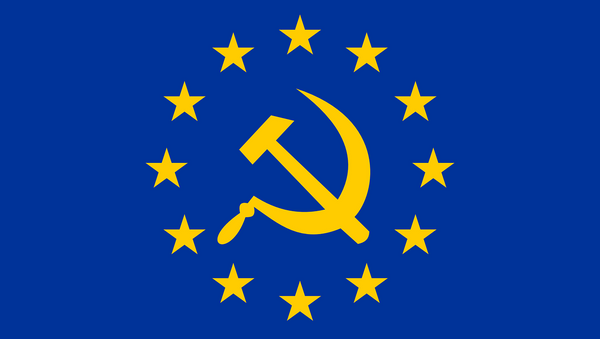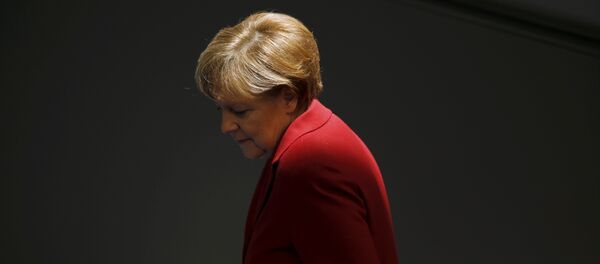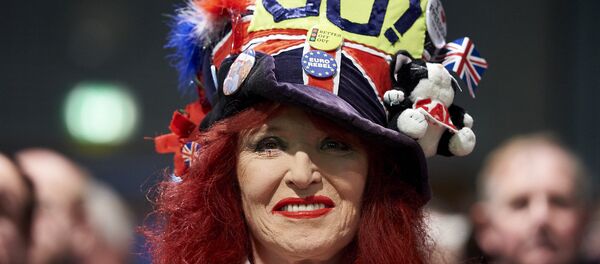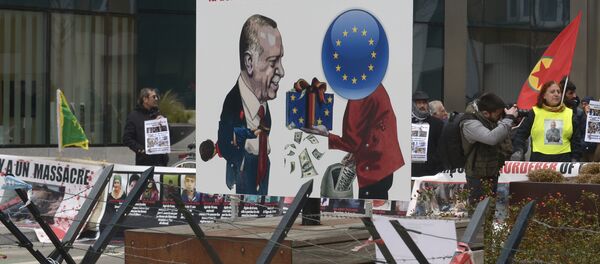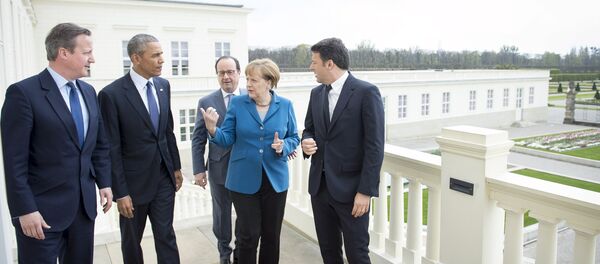Commenting on the growing euroscepticism inside the leading European countries, the independent Russian newspaper Svobodnaya Pressa recalled that while Britons' attitudes toward the EU "have always been a little 'foggy', Germany and France are the core of European integration – it's very foundation."
In this light, the paper noted, "the fact that almost a third of French and German citizens are now prepared to vote for EUexit is probably indicative of serious problems in the European Union. What went wrong? What is it that Europeans are not satisfied with within the supranational organization?"
For answers, Svobodnaya Pressa turned to Europe experts Alexander Kamkin and Maxim Bratersky.
Kamkin, a senior researcher at the Center for German Studies at the Institute of Europe under the Russian Academy of Sciences, indicated that the growth of euroscepticism is a trend that has been observed primarily over the last decade, despite the number of eurosceptics in these countries remaining in the single digits throughout the 1990s and 2000s.
In Germany, meanwhile, "the Alternative for Germany party received up to 20% of the vote in local elections recently, and favors an even more radical position, including the rejection of the euro, and a sharp limitation of the powers of the Brussels bureaucracy."
Asked about the cause for Western Europeans' increasingly anti-EU attitudes, Kamkin noted that in his view, "dissatisfaction stems from the nontransparent and very complicated decision-making process of European institutions, from Brussels' economic dictate, in agriculture first and foremost – the quotas; this is, figuratively speaking, the [forced] monoculture of the agriculture of many European countries."
In many ways, the analyst suggested, "Brussels' economic policy is reminiscent of the Soviet planned economy, only in a capitalist wrapper. For this reason, some Eurosceptic politicians and journalists sometimes even call the European Union a 'foolish and twisted parody of the USSR.'"
In this sense, Kamkin said, "it's understandable that ordinary German and French citizens are very concerned about transgenic foods actively promoted by American corporations. They are worried about the increased competition with cheaper US manufacturers, especially in the agricultural sector. Plus there's the migration crisis, which, as we have seen, the EU has proven unable to resolve."
"And the Greek question, of course, also played a role when it comes to German and French attitudes," the analyst added, "since these countries are the main donors to the EU, and forced to rescue the sinking economies of Greece and other troubled countries. German finance officials themselves recognize that the Greeks falsified statistics prior to their entry into the euro area; still, from the perspective of the Brussels bureaucracy, there is no going back, and it's necessary to pull Greece along."
On the whole, the analyst warned, "the situation, I'll say again, is reminiscent of the final years of the Soviet Union."
"If at first, in the 1960s and 1970s, the European Economic Community," the predecessor to today's EU, "really was a community and association of advanced economies, somewhere at the end of the 90s, with the incorporation of the countries of Eastern Europe, the bloc has increasingly become dominated by politics, rather than economic expediency. In the end, these disparities between political will and economic viability have led to many Europeans' frustration in the EU as a tool which had originally been designed, above all, to strengthen the competitive advantage of the European economy."
Asked to comment on the upcoming Brexit referendum, and whether it might result in a chain reaction of EUexit referendums, Kamkin emphasized that it's not worth exaggerating. "The UK, after all, has always held a semi-isolationist position with regard to European integration. This included the preservation of its national currency and the rejection of the Schengen area. In other words, Britain tried to take maximum advantage of EU membership, while taking up a minimum of obligations."
"Now, [many] Britons feel that the piggy bank of benefits has been exhausted, and that it's time to get off the sinking ship, so to speak. This is the position of Brexit supporters. But it's unlikely that the Brexit itself might influence the collapse of the EU. Rather, it can be assumed that if the migration crisis grows, if an agreement on Transatlantic partnership that is so obviously unfavorable to the European economy is signed, then, influenced by economic lobbies or governments, or by opposition parties, legal initiatives will be floated to withdraw from the EU…"
"The concept of 'Euroscepticism' did not appear yesterday. At the same time, it must be admitted that the EU has gone through a series of crises in recent years. This does not mean that it will fall apart tomorrow, but the EU has grown too rapidly and has absorbed too many disparate economies and cultures. It faces uneven levels of economic development, and a lack of a common fiscal policy, and there is much more that it lacks."
Crisis after crisis, most recently the one associated with Middle Eastern refugees and migrants, "cannot but help to irritate many Europeans," Bratersky noted. "But as far as the citizens of the leading EU countries – the Germans and the French, are concerned, there the situation is somewhat different," he added.
"I suspect that the Germans opposed to EU membership are unhappy with what they believe is the situation where 'Germany pays everyone else's debts'. For instance, the money sent to save the Greek economy came mostly from Germany. And many Germans may have already asked themselves the question: 'why should we hardworking people feed someone else out of our own pockets'?"
At the same time, the analyst suggested, "in general, the dissatisfaction of many Europeans can be explained by the fact that the European elite, the European bureaucracy has distanced itself from ordinary people. Brussels solves its own problems, while Europeans no longer feel that their opinion is always taken into account – no longer believe that EU policy is created based on the interests of its citizens."
Finally, asked whether these issues were an indication of the need for serious reforms, Bratersky suggested that unfortunately, the leaders don't exist who might be capable of doing so. "Where are the modern-day Charles de Gaulles, the modern-day Helmut Kohls? What's necessary is politicians of this magnitude…Angela Merkel, in her own right, is of course a talented person. But she's not on par with such leaders."
In fact, the analyst suggested, almost the entirety of the European leadership consists of "absolutely greyish bureaucrats; if you ask a German in the street the name of the head of the European Commission, it's unlikely that you'll get an answer. Officials in Brussels are changed like gloves; nobody knows who they are."

